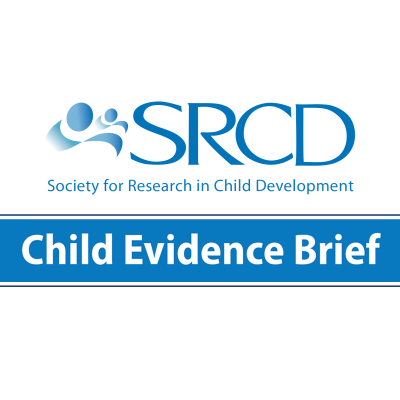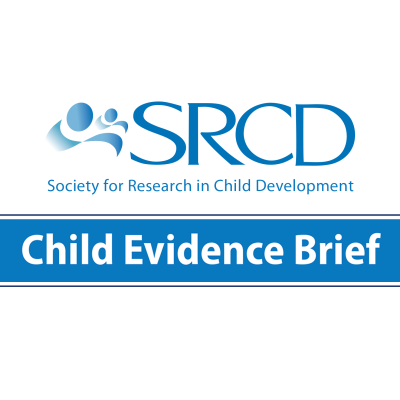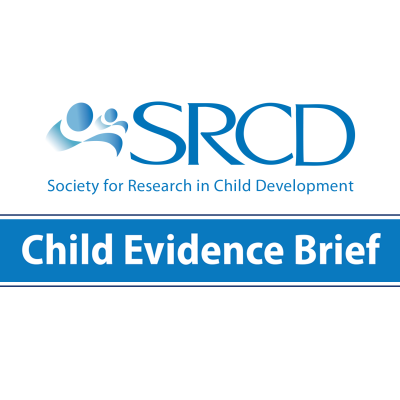Strengthening Mental Health Support Services for Refugee Children Resettled in the U.S.
Edited by Rebekah Levine Coley, Ph.D., Boston College. For more information, contact the Society for Research in Child Development, at policy@srcd.org.
Authors
- Mary Bunn, Ph.D., LCSW, Department of Psychiatry, University of Illinois Chicago
- Theresa S. Betancourt, Sc.D., M.A., School of Social Work, Boston College
There are more than 11 million refugee children worldwide who have been forced to flee their homes due to persecution or a fear of persecution based on race, religion, nationality, or membership in a social or political group, often tied to experiences of war and armed conflict.1 Increasing numbers of refugee children and youth are resettling in the U.S.2,3 Refugee children experience elevated levels of depression, anxiety, posttraumatic stress disorder (PTSD), behavioral and social problems, social isolation, and family conflict compared to U.S. born children.4 These experiences can lead to mental health risks across the lifespan. While mental health services can reduce risks, they remain out of reach for many vulnerable children and youth nationwide, particularly refugee children and families. Though the quality of family, school, and community relationships shape the mental health of refugee children, few services are equipped to respond to children’s diverse needs in each of these contexts and there is little focus on prevention and the cultural diversity of resettling populations in the U.S.5 To improve mental health care for refugee children, key recommendations for federal and state policymakers include increasing investments in a continuum of mental health services and in further developing effective family, school, and community- level prevention and treatment interventions.
Refugee Children and Adolescents Face Various Traumas and Stressors Before, During, and After Migration
In addition to exposure to trauma, experiences of war, persecution, displacement, and resettlement also disrupt sources of care and stability that are essential for supporting children’s healthy development and mental health.6 Disruptions can include separation from and death of parents and other family members, disrupted schooling, inadequate housing, and limited health care.4 Upon resettlement, refugee children and families experience additional post-migration stressors such as economic insecurity, xenophobia and discrimination, and the challenges of adjusting to life in a new culture and setting (e.g., loss of support networks, learning a new language).7-9
War, Forced Migration, and Resettlement Stressors Threaten the Mental Health and Well-being of Refugee Children and Families
It is well documented that given exposure to trauma, loss, and life-disruption, refugee children and adolescents are at increased risk for depression, anxiety, PTSD, behavioral problems, and social difficulties compared to children born in the U.S.10-13 Several experiences have been found to exacerbate these risks including pre-migration trauma events, separation from caregivers, displacement, and lack of post-migration social support.4,14 Symptoms of distress vary by child age and require developmentally-tailored assessment and care.12
War, forced migration, and resettlement stressors also influence parents and family relationships.15 Parents and caregivers often struggle with their own psychological difficulties resulting from trauma and chronic stress, which can compromise family relationships, parenting behaviors, and child well-being.16-20 Forced migration and resettlement also rupture ties to networks of family, friends, and community leading to decreased social support and greater isolation and loneliness.21,22
Access to Mental Health Services in the U.S. is Limited for Refugee Children
Despite significant needs, access to mental health services for refugee children, youth, and families is limited in the U.S. Refugee children and families experience multiple barriers to accessing adequate mental health services, including limited availability of service providers, mental health stigma, cultural and language barriers, and mistrust of service systems.23 In particular, utilization of evidence-based mental health services (i.e., interventions which have been tested and found effective) is very limited among refugee children, youth, and families.24 Moreover, most mental health services are provided only when symptoms become severe, with few prevention-oriented interventions that focus on providing skills and supports to address trauma before more severe mental health disorders develop.25,26 Though not specific to refugees, initial evidence suggests that interventions to promote mental health and prevent mental disorders are cost-effective.27
Individual, Family, and Community-Based Prevention and Treatment Services Are Needed to Support the Mental Health of Refugee Children in the U.S.
A continuum of effective mental health services ranging from low intensity mental health supports within the community for all families to more intensive, trauma-specific supports for children already experiencing mental health disorders is needed to support the mental health of refugee children and adolescents.28
- Schools and neighborhoods are important settings of development for refugee children and adolescents and as such, are promising venues for delivering prevention and intervention services.29,30 Research suggests that school-based peer support, creative expression, psychoeducational programs, and group models developed and tested for refugee children and youth can help to reduce mental health problems, improve interpersonal functioning, and increase access to needed care.31-34 For example, a school-based mental health program for Somali refugee youth in New England improved coping skills and reduced symptoms of PTSD using school-based groups and referrals to specialized services when indicated.34
- Family-based mental health services can help prevent children’s mental health problems by improving parenting skills, parent-child relationships, and family functioning.35-40 For example, a pilot study of a home visiting intervention for Somali Bantu and Bhutanese refugee families delivered by peers from the refugee community improved child mental health and behavioral problems and reduced family conflict.35
- Individual therapies including cognitive behavioral therapies (CBT) and interpersonal therapy have produced consistent results in reducing symptoms of depression, anxiety, and PTSD for children affected by trauma including refugee children.41-44
Mental Health Services for Refugee Children Need to Be Culturally Responsive and Trauma-Informed
Research highlights the importance of services being culturally responsive (i.e., integrating attention to language, cultural values, and cultural meaning)45 and trauma-informed (i.e., grounded in an understanding of how trauma affects individuals and prioritizing safety, trusting relationships, and collaboration).46 Culturally responsive and trauma-informed interventions improve engagement in services and are more acceptable and useful to culturally diverse refugee communities.47,48
How U.S. Policymakers Can Help Strengthen Refugee Children’s Mental Health and Well-being
Invest in Family, School and Community Mental Health Prevention Services. Replicate and expand promising interventions to increase the evidence base for prevention-oriented mental health services in schools, communities, and among families. This requires funding to evaluate interventions across settings and with diverse refugee populations and to expand implementation of effective prevention services.
Provide Funding to Develop and Test New Mental Health Services Including Those for Early Childhood. There remain notable gaps in the availability of effective prevention and intervention services for refugee children and youth. These include services for young children (birth to eight years old) for whom promoting parent-child attachment, addressing caregiver depression, and facilitating cultural integration are important intervention targets.21,49 Given refugee children’s experiences of discrimination and xenophobia, interventions are also needed to improve school and neighborhood climates to address bullying, educate students about different cultures and world events, and support new social connections and peer relationships for refugee children and adolescents.50-51
Expand access to evidence-based mental health treatment for refugee children and families. For refugee children and adolescents with mental health disorders, effective individual mental health treatment should be made available. This requires ensuring refugees enroll in public insurance such as Medicaid and the Children’s Health Insurance Program (CHIP)52 and funding costs related to technical assistance and training of providers in evidence-based treatments to expand access to services. Funding is also needed to further examine the effectiveness of these individual therapies across diverse refugee communities.53
Endnotes/References
(1) UNHCR (n.d). What is a refugee. UNHCR. https://www.unhcr.org/en-us/what-is-a-refugee.html
(2) UNICEF (2021). Child displacement. UNICEF. https://data.unicef.org/topic/child-migration-and-displacement/displacement/
(3) Migration Policy Institute (2021). Afghan immigrants in the U.S. Migration Policy Institute. https://www.migrationpolicy.org/article/afghan-immigrants-united-states
(4) Scharpf, F., Kaltenbach, E., Nickerson, A., & Hecker, T. (2021). A systematic review of socio-ecological factors contributing to risk and protection of the mental health of refugee children and adolescents. Clinical Psychology Review, 83, 101930. https://doi.org/10.1016/j.cpr.2020.101930
(5) Fazel, M., Reed, R. V., Panter-Brick, C., & Stein, A. (2012). Mental health of displaced and refugee children resettled in high-income countries: Risk and protective factors. The Lancet, 379(9812), 266-282. https://doi.org/10.1016/S0140-6736(11)60051-2
(6) Cummings, E. M., Merrilees, C. E., Taylor, L. K., & Mondi, C. F. (2017). Developmental and social–ecological perspectives on children, political violence, and armed conflict. Development and Psychopathology, 29(1), 1-10. https://doi.org/10.1017/S0954579416001061
(7) Li, S. S., Liddell, B. J., & Nickerson, A. (2016). The relationship between post-migration stress and psychological disorders in refugees and asylum seekers. Current Psychiatry Reports, 18(9), 1-9. https://doi.org/10.1007/s11920-016-0723-0
(8) Silove, D., Ventevogel, P., & Rees, S. (2017). The contemporary refugee crisis: An overview of mental health challenges. World Psychiatry, 16(2), 130-139. https://doi.org.10.1002/wps.20438
(9) Arenliu, A., Bertelsen, N., Saad, R., Abdulaziz, H., & Weine, S. M. (2020). War and displacement stressors and coping mechanisms of Syrian urban refugee families living in Istanbul. Journal of Family Psychology, 34(4), 392-401. https://doi.org/10.1037/fam0000603
(10) Bogic, M., Njoku, A., & Priebe, S. (2015). Long-term mental health of war-refugees: A systematic literature review. BMC International Health and Human Rights, 15(1), 29. https://doi.org/10.1186/s12914-015-0064-9
(11) Bronstein, I. & Montgomery, P. (2011). Psychological distress in refugee children: A systematic review. Clinical Child and Family Psychology Review, 14(1), 44-56. https://doi.org/10.1007/s10567-010-0081-0
(12) Kien, C., Sommer, I., Faustmann, A., Gibson, L., Schneider, M., Krczal, E., Jank, R., Klerings, I., Szelag, M., Kerschner, B., Brattström, P., & Gartlehner, G. (2018). Prevalence of mental disorders in young refugees and asylum seekers in European Countries: A systematic review. European Child & Adolescent Psychiatry, 28(10), 1295-1310. https://doi.org/10.1007/s00787-018-1215-z
(13) Nesterko, Y., Jäckle, D., Friedrich, M., Holzapfel, L., & Glaesmer, H. (2020). Prevalence of post-traumatic stress disorder, depression and somatisation in recently arrived refugees in Germany: An epidemiological study. Epidemiology and Psychiatric Sciences, 29. E40 https://doi.org.10.1017/S2045796019000325
(14) Frounfelker, R. L., Miconi, D., Farrar, J., Brooks, M. A., Rousseau, C., & Betancourt, T. S. (2020). Mental health of refugee children and youth: Epidemiology, interventions, and future directions. Annual Review of Public Health, 41, 159-176. https://doi.org/10.1146/annurey-pubhealth-040119-094230
(15) Weine, S., Muzurovic, N., Kulauzovic, Y., Besic, S., Lezic, A., Mujagic, A., Muzurovic, J., Spahovic, D., Feetham, S., Ware, N., Knafl, K. & Pavkovic, I. (2004). Family consequences of refugee trauma. Family Process, 43(2), 147-160. https://doi.org/10.1111/j.1545-5300.2004.04302002.x
(16) Betancourt, T. S., Abdi, S., Ito, B. S., Lilienthal, G. M., Agalab, N., & Ellis, H. (2015). We left one war and came to another: Resource loss, acculturative stress, and caregiver–child relationships in Somali refugee families. Cultural Diversity and Ethnic Minority Psychology, 21(1), 114-125. https://doi.org/10.1037/a0037538
(17) Sim, A., Bowes, L., & Gardner, F. (2018). Modeling the effects of war exposure and daily stressors on maternal mental health, parenting, and child psychosocial adjustment: A cross-sectional study with Syrian refugees in Lebanon. Global Mental Health, 5, e40. https://doi:10.1017/gmh.2018.33
(18) Betancourt, T. S., Keegan, K., Farrar, J., & Brennan, R. T. (2020). The intergenerational impact of war on mental health and psychosocial wellbeing: lessons from the longitudinal study of war-affected youth in Sierra Leone. Conflict and health, 14(62). https://doi.org/10.1186/s13031-020-00308-7
(19) Santavirta, T., Santavirta, N., Betancourt, T. S., & Gilman, S. E. (2015). Long term mental health outcomes of Finnish children evacuated to Swedish families during the second world war and their non-evacuated siblings: Cohort study. BMJ, 350. https://doi.org/10.1136/bmj.g7753
(20) Miller-Graff, L.E.; Wentz, B., Cummings, M.E. (2022). Evaluating the role of maternal and paternal trauma exposure, emotional security, and mental health in predicting psychological adjustment among Palestinian adolescents. International Journal of Environmental Research and Public Health, 19, 9288. https://doi.org/10.3390/ijerph19159288
(21) Wachter, K., Bunn, M., Schuster, R. C., Boateng, G. O., Cameli, K., & Johnson-Agbakwu, C. E. (2022). A scoping review of social support research among refugees in resettlement: Implications for conceptual and empirical research. Journal of Refugee Studies, 35(1), 368-395. https://doi.org/10.1093/jrs/feab040
(22) Hynie, M. (2018). The social determinants of refugee mental health in the post-migration context: A critical review. The Canadian Journal of Psychiatry, 63(5), 297-303.
(23) Ellis, B.H., Miller, A. B., Baldwin, H., & Abdi, S. (2011). New directions in refugee youth mental health services: Overcoming barriers to engagement. Journal of Child & Adolescent Trauma, 4(1), 69-85. https://doi.org/10.1080/19361521.2011.545047
(24) Colucci, E., Szwarc, J., Minas, H., Paxton, G., & Guerra, C. (2014). The utilisation of mental health services by children and young people from a refugee background: A systematic literature review. International Journal of Culture and Mental Health, 7(1), 86-108.
(25) Fazel, M., & Betancourt, T. S. (2018). Preventive mental health interventions for refugee children and adolescents in high-income settings. The Lancet Child & Adolescent Health, 2(2), 121-132. https://doi.org/10.1016/S2352-4642(17)30147-5
(26) Cummings, E. M., Merrilees, C. E., Taylor, L. K., & Mondi, C. (2017). Political Violence, Armed Conflict, and Youth Adjustment. New York: Springer.
(27) Le, LK-D, Esturas, A.C., Mihalopoulos, C., Chiotelis, O., Bucholc, J., Chatterton, M.L. & Englel, L. (2021) Cost-effectiveness evidence of mental health prevention and promotion interventions: A systematic review of economic evaluations. PLoS Med 18(5): e1003606. https://doi.org/10.1371/journal.pmed.1003606
(28) Bürgin, D., Anagnostopoulos, D., Vitiello, B., Sukale, T., Schmid, M., & Fegert, J. M. (2022). Impact of war and forced displacement on children’s mental health: Multilevel, needs-oriented, and trauma-informed approaches. European Child & Adolescent Psychiatry, 1-9. https://doi.org/10.1007/s00787-022-01974-z
(29) Byrow, Y., Pajak, R., Specker, P., & Nickerson, A. (2020). Perceptions of mental health and perceived barriers to mental health help-seeking amongst refugees: A systematic review. Clinical Psychology Review, 75, 101812. https://doi.org/10.1016/j.cpr.2019.101812
(30) Ellis, B. H., Lincoln, A. K., Charney, M. E., Ford-Paz, R., Benson, M., & Strunin, L. (2010). Mental health service utilization of Somali adolescents: Religion, community, and school as gateways to healing. Transcultural Psychiatry, 47(5), 789-811. https://doi.org/10.1177/1363461510379933
(31) Bennouna, C., Khauli, N., Basir, M., Allaf, C., Wessells, M., & Stark, L. (2019). School-based programs for supporting the mental health and psychosocial wellbeing of adolescent forced migrants in high-income countries: A scoping review. Social Science & Medicine (1982), 239, 112558. https://doi.org/10.1016/j.socscimed.2019.112558
(32) Sullivan, A. L., & Simonson, G. R. (2016). A systematic review of school-based social-emotional interventions for refugee and war-traumatized youth. Review of Educational Research, 86(2), 503-530. https://doi.org/10.3102/0034654315609419
(33) Tyrer, R. A., & Fazel, M. (2014). School and community-based interventions for refugee and asylum-seeking children: A systematic review. PloS one, 9(2), e89359. https://doi.org/10.1371/journal.pone.0089359
(34) Ellis, B. H., Miller, A. B., Abdi, S., Barrett, C., Blood, E. A., & Betancourt, T. S. (2013). Multi-tier mental health program for refugee youth. Journal of Consulting and Clinical Psychology, 81(1), 129-140. https://doi.org/10.1037/a002984
(35) Betancourt, T. S., Berent, J. M., Freeman, J., Frounfelker, R. L., Brennan, R. T., Abdi, S., Maalim, A., Abdi, A., Mishra, T., Gautam, B., Creswell, J. W., & Beardslee, W. R. (2020). Family-based mental health promotion for Somali Bantu and Bhutanese refugees: Feasibility and acceptability trial. The Journal of Adolescent Health, 66(3), 336–344. https://doi.org/10.1016/j.jadohealth.2019.08.023
(36) Weine, S. M. (2011). Developing preventive mental health interventions for refugee families in resettlement. Family process, 50(3), 410-430. https://doi.org/10.1111/j.1545-5300.2011.01366.x
(37) Weine, S., Knafl, K., Feetham, S., Kulauzovic, Y., Klebic, A., Sclove, S., Besic, S., Mujagic, A., Muzurovic, J. & Spahovic, D. (2005). A mixed methods study of refugee families engaging in multiple family groups. Family Relations, 54(4), 558-568. https://doi.org/10.1111/j.1741-3729.2005.00340.x
(38) Gillespie, S., Banegas, J., Maxwell, J., Chan, A. C., Darawshy, N. A. S., Wasil, A. R., · Marsalis, S. & Gewirtz, A. (2022). Parenting interventions for refugees and forcibly displaced families: A systematic review. Clinical Child and Family Psychology Review, 1-18. https://doi.org/10.1007/s10567-021-00375-z
(39) Bunn, M., Zolman, N., Polutnik Smith, C., Khanna, D, Hanneke, R., Betancourt, T. & Weine, S (2022). Family-based mental health interventions for refugees across the migration continuum: A systematic review. SSM-Mental Health, 2, 100153. https://doi.org/10.1016/j.ssmmh.2022.100153
(40) Slobodin, O., & de Jong, J. T. (2015). Family interventions in traumatized immigrants and refugees: A systematic review. Transcultural Psychiatry, 52(6), 723–742. https://doi.org/10.1177/1363461515588855
(41) Cohen, J., Mannarino, A., Kliethermes, M. & Murray, L. (2012). Trauma-focused CBT for youth with complex trauma. Child Abuse & Neglect, 36(6), 528-541.
(42) Nocon, A., Eberle-Sejari, R., Unterhitzenberger, J., & Rosner, R. (2017). The effectiveness of psychosocial interventions in war-traumatized refugee and internally displaced minors: Systematic review and meta-analysis. European Journal of Psychotraumatology, 8(sup2), 1388709. https://doi.org/10.1080/20008198.2017.138870
(43) Ruf, M., Schauer, M., Neuner, F., Catani, C., Schauer, E., Elbert, T. (2010). Narrative exposure therapy for 7‐ to 16‐year‐olds: A randomized controlled trial with traumatized refugee children. Journal of Traumatic Stress 23:437–45
(44) Lawton, K., & Spencer, A. (2021). A full systematic review on the effects of cognitive behavioural therapy for mental health symptoms in child refugees. Journal of Immigrant and Minority Health, 23(3), 624-639.
(45) Kirmayer, L. J., & Jarvis, G. E. (2019). Culturally responsive services as a path to equity in mental healthcare. HealthcarePapers, 18(2), 11-23.
(46) Substance Abuse and Mental Health Services Administration (2014). Samsha’s concept of trauma and guidance for a trauma-informed approach. https://store.samhsa.gov/sites/default/files/d7/priv/sma14-4884.pdf
(47) Chaze, F., Thomson, M. S., George, U., & Guruge, S. (2015). Role of cultural beliefs, religion, and spirituality in mental health and/or service utilization among immigrants in Canada: A scoping review. Canadian Journal of Community Mental Health, 34(3), 8
(48) Naseh, M., Macgowan, M. J., Wagner, E. F., Abtahi, Z., Potocky, M., & Stuart, P. H. (2019). Cultural adaptations in psychosocial interventions for post-traumatic stress disorder among refugees: A systematic review. Journal of Ethnic & Cultural Diversity in Social Work, 28(1), 76
(49) Ullmann, E., Bornstein, S., Lanzman, R., Kirschbaum, C., Sierau, S., Doehnert, M., Zimmermann, P., Kindler, H., Schauer, M., Ruf-Leuschner, M., Fegert, J., von Klitzing, K. & Ziegenhain, U. Countering posttraumatic LHPA activation in refugee mothers and their infants. Molecular Psychiatry, 23(1), 2-5. https://doi.org/10.1038/mp.2017.235
(50) Beiser, M., & Hou, F. (2016). Mental health effects of premigration trauma and postmigration discrimination on refugee youth in Canada. The Journal of Nervous and Mental Disease, 204(6), 464-470. https://doi.org/10.1097/NMD.0000000000000516
(51) da Silva Rebelo, M. J., Fernández, M., & Achotegui, J. (2018). Mistrust, anger, and hostility in refugees, asylum seekers, and immigrants: A systematic review. Canadian Psychology/Psychologie Canadienne, 59(3), 239-251. https://doi.org/10.1037/cap0000131
(52) Lacarte, V. (2022). Immigrant children’s Medicaid and CHIP access and participation [Policy Brief]. Migration Policy Institute. https://www.migrationpolicy.org/sites/default/files/publications/mpi_chip-immigrants-brief_final.pdf
(53) Chipalo, E. (2021). Is trauma-focused cognitive behavioral therapy (TF-CBT) effective in reducing trauma symptoms among traumatized refugee children? A systematic review. Journal of Child & Adolescent Trauma, 14(4), 545-558.


